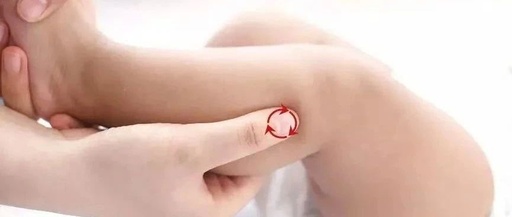The spleen is fundamental to a child’s immunity, yet many people have a limited understanding of spleen deficiency, often simply stating that a child has either Spleen Yang deficiency or Spleen Yin deficiency, and asking how to adjust their condition. Today, we will explore:
What exactly is spleen deficiency?The spleen and stomach are responsible for managing our body’s granary.As stated in the “Huangdi Neijing”: “The spleen and stomach are the officials of the granary, from which the five flavors emerge.”The granary refers to a place for storing food. The spleen and stomach are responsible for digesting and absorbing the food we eat, transforming it into nutrients that provide energy for the entire body.Thus, the spleen and stomach are the foundation of postnatal health. If the spleen is deficient, it will directly affect a child’s growth and development.Spleen deficiency, simply put, refers to the dysfunction of the spleen, which can no longer operate normally, typically categorized into Spleen Qi deficiency, Spleen Yang deficiency, and Spleen Yin deficiency. 1. Spleen Qi DeficiencyQi can be understood as function. Spleen Qi refers to all substances that enable the spleen’s functions to operate. The primary function of the spleen is to transport and transform food and fluids. When Spleen Qi is deficient, it leads to dysfunction in the spleen’s ability to transport and transform, known as Spleen Qi deficiency syndrome.Symptoms of Spleen Qi deficiency in children:Through tongue diagnosis and observing a child’s daily behaviors, one can better assess whether a child has Spleen Qi deficiency.(1) Pale or sweet taste in the mouth, pronounced eye bags;(2) Dry or loose stools, a swollen tongue with a white coating, thin white tongue coating, sallow complexion, and emaciation;(3) Children with severe Qi deficiency often appear lethargic, easily fatigued, reluctant to move, and may require carrying after just a few steps, etc.【Adjustment】Spleen Qi deficiency in children is primarily caused by improper feeding, such as overfeeding during infancy or inappropriate introduction of solid foods, which causes the delicate spleen and stomach to work beyond their capacity, leading to damage. The spleen and stomach function becomes impaired.In daily adjustments, children with Spleen Qi deficiency need to focus on tonifying the spleen and boosting Qi.【Massage Techniques】1. Tonify the Spleen Meridian: 100-300 timesStrengthens the spleen and stomach, treating cough and wheezing caused by spleen deficiency.
1. Spleen Qi DeficiencyQi can be understood as function. Spleen Qi refers to all substances that enable the spleen’s functions to operate. The primary function of the spleen is to transport and transform food and fluids. When Spleen Qi is deficient, it leads to dysfunction in the spleen’s ability to transport and transform, known as Spleen Qi deficiency syndrome.Symptoms of Spleen Qi deficiency in children:Through tongue diagnosis and observing a child’s daily behaviors, one can better assess whether a child has Spleen Qi deficiency.(1) Pale or sweet taste in the mouth, pronounced eye bags;(2) Dry or loose stools, a swollen tongue with a white coating, thin white tongue coating, sallow complexion, and emaciation;(3) Children with severe Qi deficiency often appear lethargic, easily fatigued, reluctant to move, and may require carrying after just a few steps, etc.【Adjustment】Spleen Qi deficiency in children is primarily caused by improper feeding, such as overfeeding during infancy or inappropriate introduction of solid foods, which causes the delicate spleen and stomach to work beyond their capacity, leading to damage. The spleen and stomach function becomes impaired.In daily adjustments, children with Spleen Qi deficiency need to focus on tonifying the spleen and boosting Qi.【Massage Techniques】1. Tonify the Spleen Meridian: 100-300 timesStrengthens the spleen and stomach, treating cough and wheezing caused by spleen deficiency.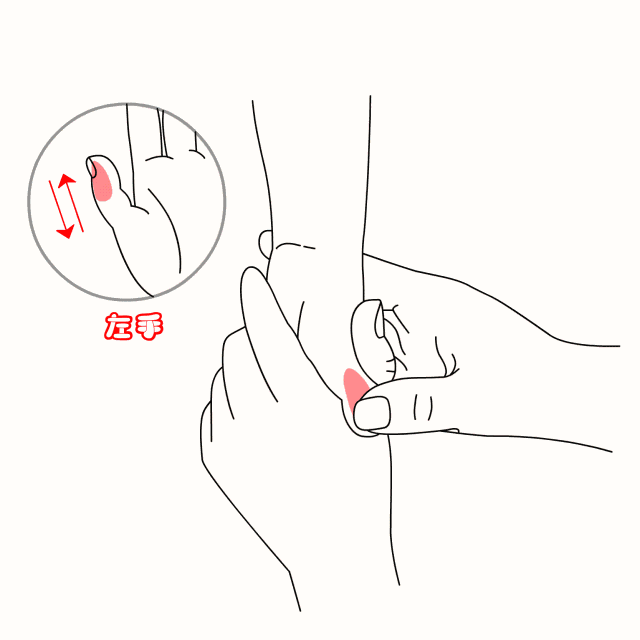 Push from the fingertip towards the base of the finger for tonification.2. Tonify the Lung Meridian: 100 timesEnhances lung Qi, resolves phlegm, and stops cough. It is used to treat children with colds, fevers, coughs, and wheezing.
Push from the fingertip towards the base of the finger for tonification.2. Tonify the Lung Meridian: 100 timesEnhances lung Qi, resolves phlegm, and stops cough. It is used to treat children with colds, fevers, coughs, and wheezing.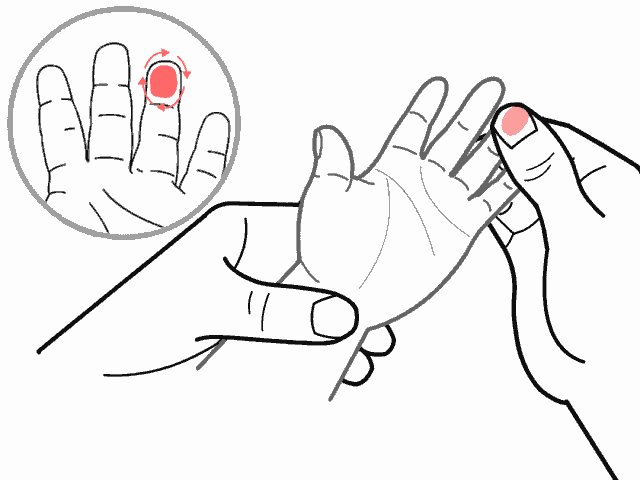 Use the thumb’s textured surface to apply pressure in a circular motion on the baby’s ring finger for tonifying the Lung Meridian.3. Spinal Pinching: 3-5 times, pinch 3 and lift 1Coordinates Yin and Yang, supports Zheng Qi, regulates Qi and blood, harmonizes the organs, and opens the meridians, promoting overall health.
Use the thumb’s textured surface to apply pressure in a circular motion on the baby’s ring finger for tonifying the Lung Meridian.3. Spinal Pinching: 3-5 times, pinch 3 and lift 1Coordinates Yin and Yang, supports Zheng Qi, regulates Qi and blood, harmonizes the organs, and opens the meridians, promoting overall health.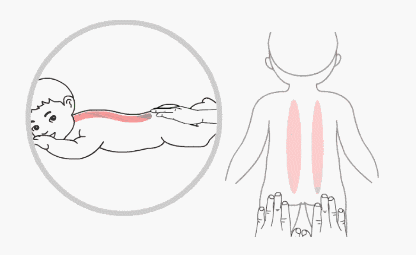 【Dietary Recommendations】The best way to tonify Spleen Qi is through Tai Zi Shen (Pseudostellaria), Bai Zhu (White Atractylodes); daily foods can include chestnuts, beef, chicken, and red dates.2. Spleen Yin DeficiencySpleen Yin deficiency refers to insufficient Yin fluids in the spleen, leading to dysfunction in its transport and transformation capabilities, clinically often manifesting as insufficient stomach Yin.Symptoms of Spleen Yin deficiency in children:(1) LipsSince the lips correspond to the spleen, “the spleen opens to the mouth, and its manifestation is in the lips.” If a child has lips that are bright red compared to others, it indicates internal heat.(2) TongueChildren with Spleen Yin deficiency often have a very thin tongue coating and a red tongue.(3) Eye BagsEye bags, referred to as “meat rings” in TCM, correspond to the spleen and stomach. Therefore, individuals with spleen deficiency will have pronounced lower eye bags, and those with Spleen Yin deficiency will have red or even purple eye bags, with a deep color.(4) Prone to HeatDry mouth and tongue, dry and hard stools, hot palms and soles, irritability, dry eyes, and heat intolerance. Parents often describe their children as easily “getting heat,” which is mostly due to Spleen Yin deficiency.Children with Spleen Yin deficiency often consume a lot of meat.【Adjustment】Spleen Yin deficiency in children is often related to late sleeping; additionally, excessive snacking can irritate the stomach and burn Yin fluids, which is another cause.In daily adjustments, children with Spleen Yin deficiency need to nourish Spleen Yin and focus on nurturing Yin and blood.【Massage Techniques】1. Rub the Nei Ting point: 200 timesThe best time is between 7 AM and 9 AM, as the stomach meridian’s Qi is most vigorous during this period.
【Dietary Recommendations】The best way to tonify Spleen Qi is through Tai Zi Shen (Pseudostellaria), Bai Zhu (White Atractylodes); daily foods can include chestnuts, beef, chicken, and red dates.2. Spleen Yin DeficiencySpleen Yin deficiency refers to insufficient Yin fluids in the spleen, leading to dysfunction in its transport and transformation capabilities, clinically often manifesting as insufficient stomach Yin.Symptoms of Spleen Yin deficiency in children:(1) LipsSince the lips correspond to the spleen, “the spleen opens to the mouth, and its manifestation is in the lips.” If a child has lips that are bright red compared to others, it indicates internal heat.(2) TongueChildren with Spleen Yin deficiency often have a very thin tongue coating and a red tongue.(3) Eye BagsEye bags, referred to as “meat rings” in TCM, correspond to the spleen and stomach. Therefore, individuals with spleen deficiency will have pronounced lower eye bags, and those with Spleen Yin deficiency will have red or even purple eye bags, with a deep color.(4) Prone to HeatDry mouth and tongue, dry and hard stools, hot palms and soles, irritability, dry eyes, and heat intolerance. Parents often describe their children as easily “getting heat,” which is mostly due to Spleen Yin deficiency.Children with Spleen Yin deficiency often consume a lot of meat.【Adjustment】Spleen Yin deficiency in children is often related to late sleeping; additionally, excessive snacking can irritate the stomach and burn Yin fluids, which is another cause.In daily adjustments, children with Spleen Yin deficiency need to nourish Spleen Yin and focus on nurturing Yin and blood.【Massage Techniques】1. Rub the Nei Ting point: 200 timesThe best time is between 7 AM and 9 AM, as the stomach meridian’s Qi is most vigorous during this period.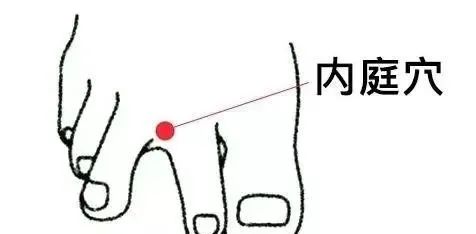 2. Rub the Tian Shu point: 2 minutesThis can help with bowel movements; rub the Tian Shu point for 2 minutes after meals, which can be done daily.
2. Rub the Tian Shu point: 2 minutesThis can help with bowel movements; rub the Tian Shu point for 2 minutes after meals, which can be done daily.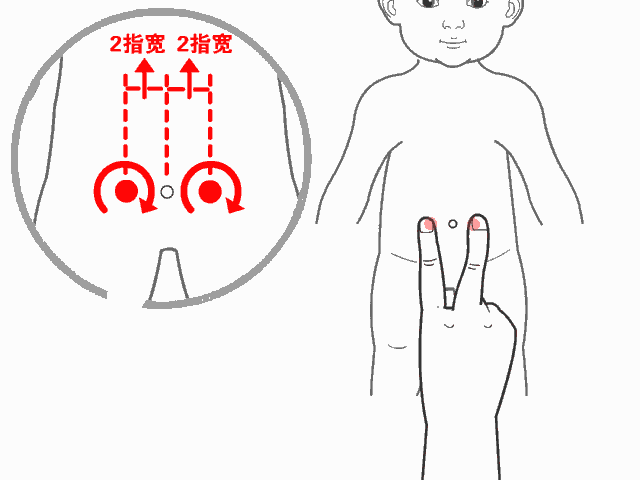 3. Press and rub the Zu San Li point: about 100 timesThis has the effect of regulating the body’s immunity, enhancing disease resistance, adjusting the spleen and stomach, and supporting Zheng Qi while expelling pathogenic factors.
3. Press and rub the Zu San Li point: about 100 timesThis has the effect of regulating the body’s immunity, enhancing disease resistance, adjusting the spleen and stomach, and supporting Zheng Qi while expelling pathogenic factors. 【Dietary Recommendations】In addition to avoiding excessive consumption of fried and spicy foods, children should also avoid too many warming and drying foods, such as dog meat, lamb, chili, and Sichuan pepper, as these can exacerbate symptoms of Yin deficiency and heat.We often say thatShan Yao (Chinese Yam) strengthens the spleen, but it actually nourishes Spleen Yin;Other foods such as duck meat, wheat, tofu, tomatoes, and black plums also have the effect of nourishing stomach Yin.Food supplementation is not as effective as sleep supplementation; children with Spleen Yin deficiency should cultivate the habit of sleeping before 9 PM, as nighttime is the time for Yin, and sleeping is the process of Yang entering Yin, allowing Yin fluids to be nourished.3. Spleen Yang DeficiencyYang Qi refers to energy, or can be understood as Qi that has warming and promoting effects.Spleen Yang primarily refers to the substances that provide warmth and promote function within the spleen, akin to the “firepower” for a child’s growth and development. Children with Spleen Yang deficiency lack this firepower, resulting in insufficient warmth and impaired spleen and stomach function.Symptoms of Spleen Yang deficiency in children:(1) Pronounced lower eye bags, but not red, with a pale color.(2) Lips that are not bright red, but normal or pale in color.(3) A pale tongue, often with teeth marks and a greasy coating.(4) Insufficient warming energy, leading to cold intolerance, cold hands and feet, excessive sweating, shortness of breath, weakness in limbs, low energy, and a lethargic mental state.(5) Loose stools that are unformed.(6) Abdominal bloating after meals, and the body is prone to swelling.(7) Frequent nasal inflammation, sneezing, and susceptibility to colds.Spleen Yang deficiency often occurs on the basis of Spleen Qi deficiency, combined with Yang deficiency symptoms.Parents should consider whether their child has been over-prescribed antibiotics or has consumed too many bitter and cold herbs. Another cause could be exposure to cold, leading to insufficient Yang Qi, such as frequent consumption of cold drinks or exposure to air conditioning, which can harm the child’s spleen and stomach.【Adjustment】Spleen Yang deficiency often results from excessive consumption of cold drinks in summer or prolonged illness leading to weakness, resulting in a state of Spleen Yang deficiency, also known as Spleen and Stomach Cold Deficiency.In daily adjustments, children with Spleen Yang deficiency need to warm and tonify Spleen Yang.【Massage Techniques】In addition to the Spleen and Stomach points, there are many acupressure points on the hands.1. Tonify the Spleen Meridian: once a day, moderate pressureFor children under one year old, light and short strokes for mild symptoms, about 50-70 times; for longer-lasting or severe symptoms, at least 100 times or more.
【Dietary Recommendations】In addition to avoiding excessive consumption of fried and spicy foods, children should also avoid too many warming and drying foods, such as dog meat, lamb, chili, and Sichuan pepper, as these can exacerbate symptoms of Yin deficiency and heat.We often say thatShan Yao (Chinese Yam) strengthens the spleen, but it actually nourishes Spleen Yin;Other foods such as duck meat, wheat, tofu, tomatoes, and black plums also have the effect of nourishing stomach Yin.Food supplementation is not as effective as sleep supplementation; children with Spleen Yin deficiency should cultivate the habit of sleeping before 9 PM, as nighttime is the time for Yin, and sleeping is the process of Yang entering Yin, allowing Yin fluids to be nourished.3. Spleen Yang DeficiencyYang Qi refers to energy, or can be understood as Qi that has warming and promoting effects.Spleen Yang primarily refers to the substances that provide warmth and promote function within the spleen, akin to the “firepower” for a child’s growth and development. Children with Spleen Yang deficiency lack this firepower, resulting in insufficient warmth and impaired spleen and stomach function.Symptoms of Spleen Yang deficiency in children:(1) Pronounced lower eye bags, but not red, with a pale color.(2) Lips that are not bright red, but normal or pale in color.(3) A pale tongue, often with teeth marks and a greasy coating.(4) Insufficient warming energy, leading to cold intolerance, cold hands and feet, excessive sweating, shortness of breath, weakness in limbs, low energy, and a lethargic mental state.(5) Loose stools that are unformed.(6) Abdominal bloating after meals, and the body is prone to swelling.(7) Frequent nasal inflammation, sneezing, and susceptibility to colds.Spleen Yang deficiency often occurs on the basis of Spleen Qi deficiency, combined with Yang deficiency symptoms.Parents should consider whether their child has been over-prescribed antibiotics or has consumed too many bitter and cold herbs. Another cause could be exposure to cold, leading to insufficient Yang Qi, such as frequent consumption of cold drinks or exposure to air conditioning, which can harm the child’s spleen and stomach.【Adjustment】Spleen Yang deficiency often results from excessive consumption of cold drinks in summer or prolonged illness leading to weakness, resulting in a state of Spleen Yang deficiency, also known as Spleen and Stomach Cold Deficiency.In daily adjustments, children with Spleen Yang deficiency need to warm and tonify Spleen Yang.【Massage Techniques】In addition to the Spleen and Stomach points, there are many acupressure points on the hands.1. Tonify the Spleen Meridian: once a day, moderate pressureFor children under one year old, light and short strokes for mild symptoms, about 50-70 times; for longer-lasting or severe symptoms, at least 100 times or more.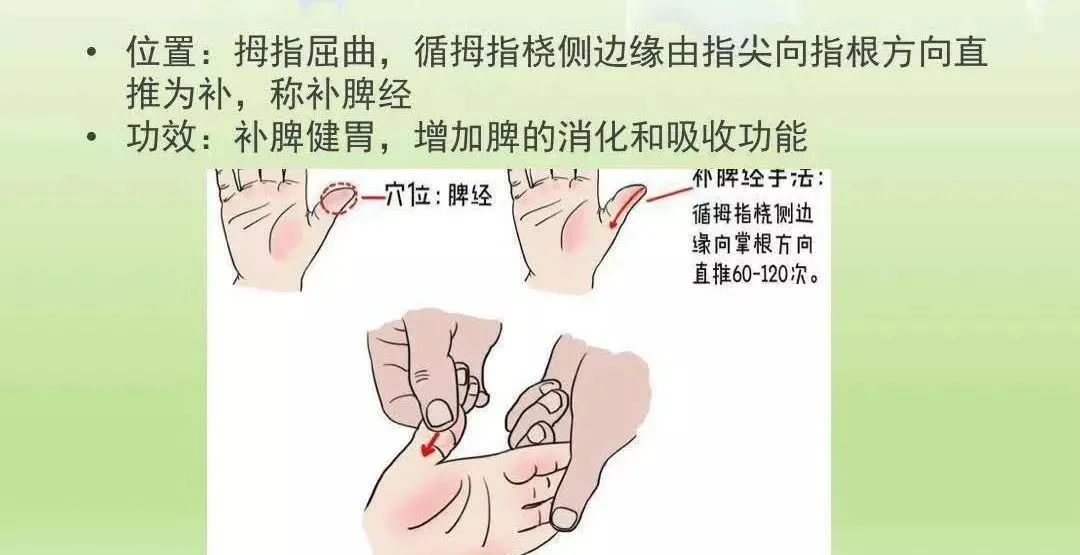 Push from the fingertip towards the base of the finger for tonification.2. Push the Shang San Guan pointThe frequency of pushing should be fast, aiming for 200 times in one minute.
Push from the fingertip towards the base of the finger for tonification.2. Push the Shang San Guan pointThe frequency of pushing should be fast, aiming for 200 times in one minute.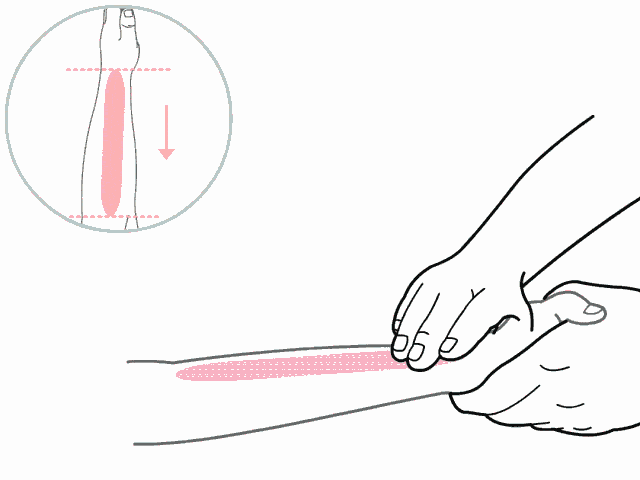
Use the thumb’s radial side or the surfaces of the index and middle fingers to push from the wrist towards the elbow, known as pushing the three passes or pushing the upper three passes.
【Dietary Recommendations】Cold and cooling foods should be avoided, such as herbal teas, yogurt, and kiwi, which parents often like to give their children, as these can harm Spleen Yang. Daily foods can include pig stomach and spring sand fruit to warm the spleen and strengthen the stomach. Additionally, the saying goes, “Cold originates from the feet,” so parents can regularly soak their children’s feet until they sweat slightly to help dispel cold.Final ThoughtsClinically, children often present with Qi deficiency, with weak spleen function. Prolonged spleen deficiency can affect Spleen Yang, leading to Yang deficiency; Spleen Yin deficiency generally occurs after febrile diseases that damage stomach Yin, particularly after high fevers, making children most susceptible to Spleen Yin deficiency.Regardless of whether it is Spleen Qi deficiency, Spleen Yang deficiency, or Spleen Yin deficiency, they all boil down to spleen deficiency, indicating that children have poor spleen and stomach function, insufficient digestive absorption and metabolic capacity, leading to food accumulation and an inability to provide adequate nutrition for growth and development.Although they are all classified as spleen deficiency, the methods of adjustment and suitable foods differ, and some may even be opposite. For instance, Spleen Yang deficiency requires warming tonification, while Spleen Yin deficiency must be cautious with warming foods, but children’s diets should not be excessively cold either.However, regardless of the type of supplementation, it must be done when the child is not experiencing food accumulation. Therefore, when adjusting for spleen deficiency in children, the first focus should be on digestion; once the child’s digestive state is good, then tonify the spleen.
⊙Copyright Statement:Some images and articles are sourced from the internet; if there is any infringement, please contact us for removal.
⊙Disclaimer:The viewpoints in this article are neutral and are for reference and exchange only.

